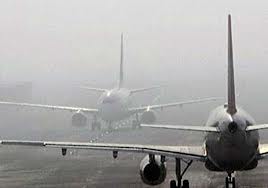
New Delhi, December 24: Dense fog badly hit operations at the Indira Gandhi International airport here on Monday affecting the schedule of over 50 domestic and international flights.
About 35 flights were delayed while 15 were cancelled as the dense fog enveloped the airport this morning.
One of the international flights was diverted to Jaipur, airport sources said.
Runway visibility started to deteriorate from late Sunday and general visibility reduced to less than 100 metres in the morning, leading to delay in departures of early morning flights.
The general visibility on the main runway (28/11 which is the most preferred runway by airlines during the foggy days) was almost zero while the runway visibility was 75 metres.
At one time the runway visibility dropped to zero at one end of the third runway.
The operations at the third runway remained suspended for major part of the morning due to poor visibility, an airport official said.
The MeT department has predicted CAT-III B fog (dense fog when the runway visibility drops to below 50 metres) till Christmas.
On Sunday also, over 100 flights were badly affected due to dense fog.





Comments
Add new comment